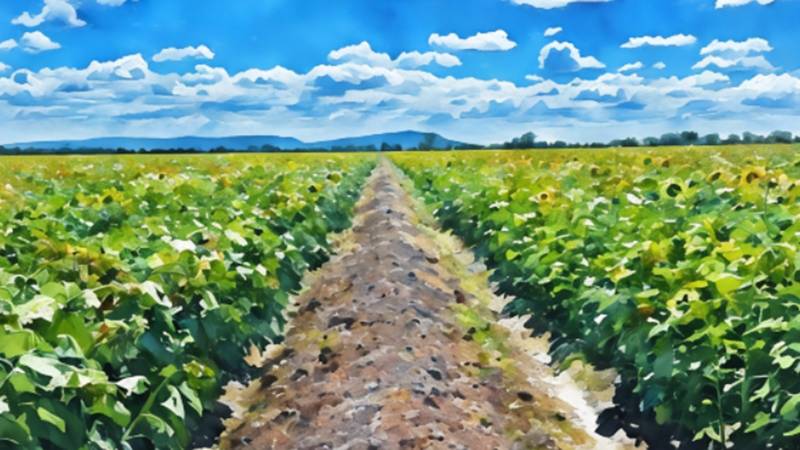
Of the many visits that I have made since 2007 to this small agricultural town of Griffith in the state of New South Wales in Australia, the first long visit of nearly one year was in 2014. To fend off isolation and monotony, I joined a group of senior citizens who met thrice a week for an hour each week. The group is part of an Australia-wide organization called U3A, University of 3rd Age, which provides a social umbrella to the growing number of septuagenarians and octogenarians, many nonagenarians, and some centenarians. I, being barely a sexagenarian, was the youngest of the group, though now, a decade later, I no longer hold that title. The meetings are held in the Senior Citizens' Centre maintained by Griffith City Council.
When I attended my first meeting there, I found that I was the first non-European to have joined the group. However, the warm welcome that I received, the friendly attitude of the members and the amiable environment quickly dispelled any apprehensions that I may have had. After each meeting, members dispersed in smaller groups to have biscuits and a 'cuppa,' which I correctly guessed was a slang for a cup of tea or coffee. I noticed that one tall and lean member of the group, always seated in one of the back or side seats, would quietly get up about five minutes before the end of the meeting, walk into the kitchen at the back, switch on the electric kettle, lay out about a dozen paper or Styrofoam cups on the serving sill, put a teabag in half of these, a spoon of coffee in the rest, pour boiling water in them all and have the cuppas ready for when the meeting finished. We would all go and collect a cup, add sugar and milk, take a biscuit from the jar and socialize for about ten to fifteen minutes, before departing for home or our next commitment of the day. I also learned about the very active lady who was, and still is, the secretary of U3A and who also organized the Thursday meetings.
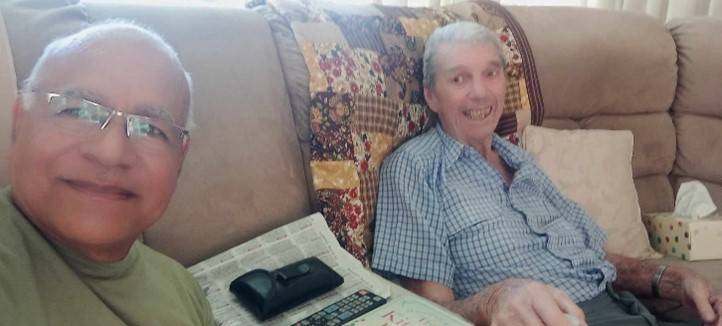
The acquaintance with the gentleman, Paul Gribble and the lady, Anne Gribble, soon turned into a close friendship – the first of my many good friendships that I developed in Griffith. I found that while Paul was an affable friendly soul, his wife was a literary person. After a few social small talks with Paul, he realized that my knowledge of the town was limited to its sole main street. He offered to take me around the area and show how the town got developed. Next day, Paul picked me up from my home in his well-used ute vehicle; the single or double cabin utility vehicle, now much maligned as 'Vigo Dala' in Pakistan. Griffith being a farming town, the ute is the favoured vehicle for most of the people.
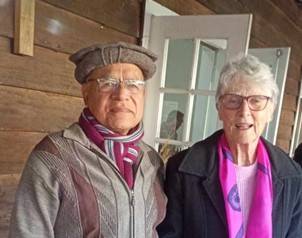
Paul took off for the north-easterly direction out of the town. The trip turned out to be fruitful for this author’s love of history. Skirting the township of Yoogali on our right, we travelled on the Rankin Springs Road. Shortly we reached the railway station of Beelbangera with a few houses around. Paul told me that when railway line was laid out in early last century, Griffith was a non-descript place and Beelbangera was the hub of railways system in this area. I realized that this fact wouldn't be known to the younger generations here. Paul also explained how the canals were brought to this area, which was uninhabitable earlier, but is one of the largest agricultural productive zones in the country. He also explained that the land in this region belonged to the Aboriginal Wiradjuri people, who had lived here for about 40,000 years before the white men arrived. This land, however, was taken over by the Crown, divided into smaller manageable parcels and allocated to the farmers. He seemed to know everything about the history of development in the region. Further up the road, we reached a fork where the left track peeled off for Rankin Springs and the sharp turn to the right led us to the wine industry town of Yenda, which is also the route taken for travelling from here to Wagga Wagga (the hometown of brilliant cricketers Steve and Mark Waugh), Canberra (four hours away) and Sydney (seven hours away).
As one of his friends said, "He looked and acted what he always was; a hardworking farmer"
Short of Yenda, Paul turned left. I looked at the road sign and it said “Gribble Road,” which, of course, is the surname of Paul's family. He explained that his father was one of the first farmers in the area and this road was named after him. He drove into a farmhouse on the street. He was born and raised here, and had lived here for decades as a child and a grownup man. The house was visibly old. His son Chris lives there now with his family. I met his wife who was an avid reader, like Anne, her mother-in-law, and a member of the local reader's club. I was offered a cuppa.
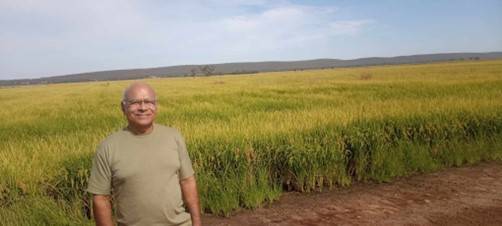
We then drove on to the hills on our left. The shallow Binya hills are home to Cocoparra National Park, an area preserved for natural vegetation and wildlife. We parked the ute and walked for a little distance. I saw kangaroos, herd of wild goats, many small animals and host of birds. There were walking tracks through the wild. Paul told me that many people came here over the weekends, though on the noon of that working day, I found the Park deserted.
In a later visit, Chris drove me around his rice fields, explaining the whole process of rice farming from laser levelling, through fertilizing, sowing (seeds), watering and then harvesting. Nothing was done manually as machines (huge computerized machines) did all the work. He had extended and built up on the farm that he had inherited.
On some more visits to other wheat and cotton farms, it was evident to this author that these farmers readily adopted and absorbed technology, thus enhancing output, preserving yield and minimizing water use. As the farms grew in this area in the middle of the last century, especially with some allocated to soldiers returning after the First World War, the farmers found themselves at the mercy of the middlemen. At some stage, they got together to form cooperatives. Paul was on the board of Yenda Producers’ Coop Society for forty long years. The coop takes care of farmers' needs on the supply side, for fertilizers, insecticides, herbicides, farm machinery, irrigation equipment, tools, etc; and on marketing side for logistics and price stability.
That trip with Paul was followed by many more, the last one being in the middle of April this year. I visited his home a few more times, when we chatted about our children and life in general. He mostly wore shorts, a front-buttoned shirt and a top hat. As one of his friends said, "He looked and acted what he always was; a hardworking farmer."
I met his wife several times. Once she gave me a book that she had written about his father starting a farm here, raising his family and the growth of Griffith town. It is a short 70-page booklet but complete with a title page, dedication, content list, pictures and an index. The book proved, if any proof was needed, that Anne is not only scholarly but a meticulous worker. The book encouraged me also to write about my family. In fact, the first article that I wrote, about my father's migration from Amritsar to Lahore in 1947 and published in this magazine, was inspired by that book. Since then, I have written over 170 articles in this space. I realized that history is not only about kings, empires and wars, it is, more importantly, about how people live their lives. To a large extent, I owe my very rewarding writing career to Anne. We remain in contact through email.
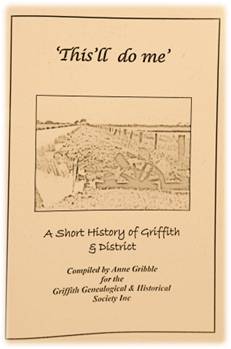
Paul has three sons. He was proud of them, who, he said, didn’t go to university but were all hardworking and got the education that they needed for their chosen profession. Two of them live in Griffith and one in Western Australia. One is Chris, the farmer that I have often met. He is trained in metalwork and welding, that enables him to run his workshop for farm machinery. Another, Rodney, is an auto-mechanic, owns farm machinery and does farm work on contract. The third, Guy, is an auto-electrician and pursues electro-mechanical engineering work. They are all obedient, respectful and prosperous.
Once, perhaps in 2015, I happened to see that Paul had a long vertical cut on his chest. On my enquiring, he laughed and said that he was member of the zipper club. Seeing my blank look, he told me that he had had a heart bypass surgery. He was taking some high potency blood thinners which made him bleed easily. He showed me the bruises on his legs and arms. When I was scheduled for my own bypass surgery three years later, I called him to tell him that I, too, was joining the zipper club.
Last year, while I was in Islamabad, I learned that he was very sick. However, the sturdy old man recovered against all odds, which was nice because I could meet him when I came back here in November last. I found that he had gone quite frail. He had to use a walker, but was attending the U3A meetings regularly. He couldn't drive and needed his wife to take him around. In April, he asked me to come along to visit the farm again. There, Chris showed me his large collection of farm machinery, most costing hundreds of thousands of dollars – with one, a GPS-equipped combined rice-cum-wheat harvester worth over a million dollars. He had a workshop where most of the mechanical repairs of his machines could be carried out. We then drove out to his farms where the rice crop had nearly matured. During the drive, I learned about different types of rice. He grew the flavourless, medium grained variety because it was favoured by the east Asian export market. As always, the trip was informative and enjoyable.
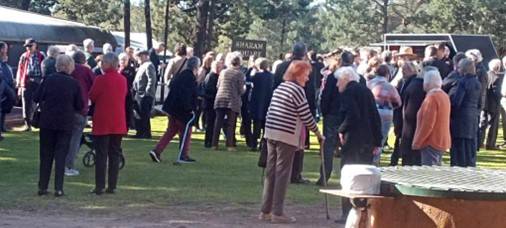
The last I met Paul was in the U3A meeting. We greeted each other warmly but he looked drawn down. Two weeks later, I learnt that he had passed away peacefully the previous night; on the 22nd of June. While changing into his night suit with the help of his wife, he walked out to the next world. That is the death that most of us, in our twilight years, hope for; in our bed, in our home, in the presence of our loved ones. He was one year short of his 90th birthday. I spoke to Anne that evening, who was in grief but composed. She said that with his increasing medical issues, it was time for him to go. On his desire, Paul was cremated. A wake (a meeting in honour of the deceased) was held on the 1st of July. It was a well-attended event. There were some speeches by his childhood friends and family members; celebrating his life and mourning his departure. A fine man had left this world.
Rest in peace, Paul. You will be missed.

